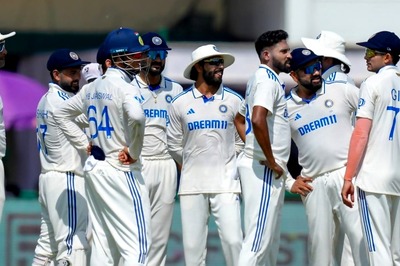
views
Cairo: Hundreds of thousands of Egyptians, from students and doctors to the jobless poor, swamped Cairo on Tuesday in the biggest demonstration so far in an uprising against an increasingly isolated President Hosni Mubarak.
Waving Egyptian flags and banners saying "Bye-Bye Mubarak," the protesters rejected promises of reform to his authoritarian rule and demanded that he quit.
Huge rallies also took place in the cities of Alexandria and Suez, where protesters chanted: "Leave, leave. Revolution, revolution everywhere."
Opposition figurehead Mohamed ElBaradei said Mubarak, 82, must leave the country before the reformist opposition would start talks with the government on the future of the Arab world's most populous nation.
"There can be dialogue but it has to come after the demands of the people are met and the first of those is that President Mubarak leaves," he told Al Arabiya television.
Mubarak's grip looked increasingly tenuous after the army pledged on Monday night not to confront protesters, effectively handing over the streets to them after they pledged to bring out one million people nationwide.
The uprising of a population fed up with corruption, oppression and economic hardship broke out eight days ago and quickly spiraled to a crisis unprecedented during 30 years of rule enforced by ruthless security forces.
The disintegration of Mubarak's power structure would usher in a new era in modern Egyptian history and reconfigure the geopolitical map of the Middle East, with huge ramifications for Washington and allies from Israel to oil giant Saudi Arabia.
The army, a powerful and respected force in Egypt, dealt a possibly fatal blow to Mubarak on Monday night when it said troops would not open fire on protesters and that they had legitimate grievances and a right to peaceful protest.
Soldiers in Tahrir (Liberation) Square, that has become a rallying point for the protests, erected barbed wire barricades but made no attempt to interfere with people. Tanks daubed with anti-Mubarak graffiti stood by.
Barbed wire barricades also ringed the presidential palace, where Mubarak is believed to be hunkered down.
"We have done the difficult part. We have taken over the street," said protester Walid Abdel-Muttaleb, 38. "Now it's up to the intellectuals and politicians to come together and provide us with alternatives."
Effigies of Mubarak were hung from traffic lights and some protesters carried a mock coffin.
The crowd included lawyers and other professionals as well as workers and students, showing the breadth of opposition to Mubarak. Women and men stood together holding hands.
The demonstration was an emphatic rejection of Mubarak's appointment of a new vice president, Omar Suleiman, cabinet reshuffle and offer to open a dialogue with the opposition.


















Comments
0 comment